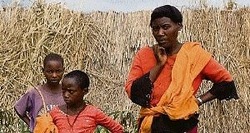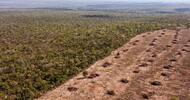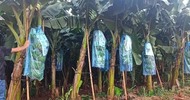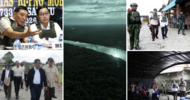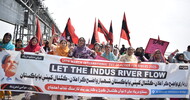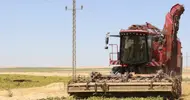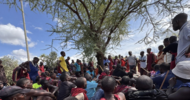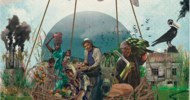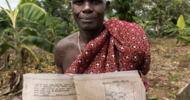The Examiner | 20 October 2011
Denise Hall
LAND — they are not making any more of "the solid part of the surface of the earth, as distinct from lakes, seas, etc."
Of course, it’s much more than that for those who live on the land and reap its bounty — check out the Bull McCabe’s impassioned roars in defence of his plot in The Field, or the stately speeches of dispossessed native American chiefs.
For some indigenous peoples, losing their land has been too painful and bewildering. In the Guarani tribes of Brazil, suicide rates are 19 times higher than the national average — fatal consequences of land loss, according to a recent report from Survival International, released to coincide with World Mental Health Day.
And when the Chagos Islanders were forcibly removed by the British from the island of Diego Garcia, in order to make way for an American military base, several of their number threw themselves over the side of the boat on their journey to Mauritius.
The land and who claims rights to it has always been an emotional and contentious issue — but perhaps never more so than today, when there is fierce competition over its use, and its spiralling value.
Some 227 million hectares have been sold or leased in large scale land deals since 2001, including the homes of many thousands of rural people who have problems establishing title.
These transactions have largely been conducted by international investors in a modern-day land rush that, among other things, fuels the drive to supply increased demand for food in a world whose population has recently hit the seven billion mark.
Oxfam Ireland has identified this as one of the most alarming trends facing rural populations in the developing world today.
One company in particular has recently come under intense scrutiny for the effect their operations have had on local communities. London-based New Forests Company (NFC) would, on the face of it, seem to be the design blueprint of how a young, modern company should conduct a major land investment in Africa in a responsible and ethical way.
But Oxfam’s recent Land and Power report has revealed that more than 22,500 Ugandans have lost their homes and land to make way for NFC projects, and have been left destitute, without enough food or the means to send their children to school.
Formed in 2004, NFC harvests timber on 27,000 hectares of "under-utilised and/or degraded" land in Uganda, Tanzania, Mozambique and Rwanda. It has deals in those countries totalling around 90,000 hectares.
The most significant investment in NFC comes from the HSBC bank.
In 2008, the Uganda Investment Authority named NFC Investor of the Year, and the Forest Stewardship Council have certified two of NFC’s Ugandan plantations.
NFC has built schools, clinics, runs literacy programmes and tree-sourcing schemes. So why, then, have thousands of people in affected communities alleged that land clearance to make way for NFC’s operations was involuntary, accompanied by distress and violence, leaving many in a state of poverty?
"My land gave me everything from my living to my children’s education," Ugandan farmer Frances Longoli says. "I remember my land, I was given awards as a model farmer. I had three acres of coffee, many trees, mangoes and avocados, five acres of bananas, cows for milk, and 10 beehives.
"People used to call me Omataka, someone who owns land. Now that is no more. I am one of the poorest now."
NFC’s position is that they have played no part in any evictions of what the Ugandan Government refers to as "illegal encroachers". Their negotiations have been conducted with the government, and it is not for them to interfere in how they chose to enforce their own laws. NFC maintain that they are deeply concerned with the welfare and future of local communities.
Some of those affected by clearances say that their land had been given to them in recognition of their fathers or grandfathers having fought for the British Army in Burma and Egypt during the Second World War. Others say they were in the process of converting their title from customary to freehold tenure, when this crisis struck. Others claim tenure of their land for over 40 years, having been invited there by the Idi Amin regime.
These communities had established village and government structures, schools, health centres and farms, and grew crops to feed themselves and had surpluses to sell at market, money that funded their children’s education.
NFC negotiated their commercial timber deal with the Ugandan Government in 2004, and does not own or lease the land. Its licence comes with strict conditions, which does not allow them to grow food crops or run cattle. The land in these reserves is gazetted, meaning it is protected as a matter of national importance.
And NFC insists that the claims against them have failed in court because of the plaintiffs’ inability to assert a legitimate case. However, Uganda’s High Court has decided that the communities’ concerns were sufficiently valid to justify restraining evictions, until the full case could be heard in court.
NFC argues, "No party has proven that the land was de-gazetted, and thus, the encroachers are illegally occupying land leased to an independent third party, NFC. It claims that only 31 families had the legal right to remain on the land, and that the thousands of others who were living there were ‘illegal encroachers’ who do not have legitimate right to compensation.
But be that as it may, thousands of people were living there, and had been invited to do so as a way of repaying them for military service or at the behest of the volatile — and often murderous — government of Idi Amin.
What strikes me as hugely wrong with this picture is not so much how the legalities of people residing in reserves are being interpreted. It is the continuing assumption of those who have the power to do so, to simply move people around as if they were pieces on some flawed chessboard. And when governments — and policies — change, another game with new and unknown rules begins, upending a new generation settled on the land.
Mary Nantale has eight children, and has lived on the Luwanga reserve in Uganda since 1976. "When they evicted us, they told us there was a white man who wanted the land. They would only say that the land was not ours, and we were supposed to leave, because it was a forest reserve.
"When we refused to go, we were evicted in a violent way. Armed men slashed my banana plantation and destroyed my home. Now I don’t hope for anything anymore. I am just surviving. We need compensation. We know we can’t go back, but we need a place to live. We are treated as enemies."
Many evictees describe feeling dehumanised. "I lost my land. I’m landless. My land was my life. Now I have no rights. It’s like I am not a human being," one man told researchers.
Another man tells of how he had heard that there was land being allocated for Second World War veterans and their families. Augustin Allen presented his father’s service papers, and was allocated 31 acres, where he grew bananas, coffee and maize, selling most of it to traders, and he was able to pay for his children’s education. "There were no consultations before evictions, " he says.
Oxfam heard how the police dismantled the local primary school — named Bright Future — and set fire to the school chairs and desks. "One of the things that touches my life most now is that I have forgotten the feeling of eating well," one disposed woman said.
On June 19, 2009, the Ugandan High Court issued the interim order which restrained any further evictions or the destruction of crops, livestock schools and hospitals. The order was to be in force until October 2, 2009, at which time the case was to be reheard. But that hearing did not take place. The communities concerned were unable to raise the money for their lawyers’ fees.
Denise Hall
LAND — they are not making any more of "the solid part of the surface of the earth, as distinct from lakes, seas, etc."
Of course, it’s much more than that for those who live on the land and reap its bounty — check out the Bull McCabe’s impassioned roars in defence of his plot in The Field, or the stately speeches of dispossessed native American chiefs.
For some indigenous peoples, losing their land has been too painful and bewildering. In the Guarani tribes of Brazil, suicide rates are 19 times higher than the national average — fatal consequences of land loss, according to a recent report from Survival International, released to coincide with World Mental Health Day.
And when the Chagos Islanders were forcibly removed by the British from the island of Diego Garcia, in order to make way for an American military base, several of their number threw themselves over the side of the boat on their journey to Mauritius.
The land and who claims rights to it has always been an emotional and contentious issue — but perhaps never more so than today, when there is fierce competition over its use, and its spiralling value.
Some 227 million hectares have been sold or leased in large scale land deals since 2001, including the homes of many thousands of rural people who have problems establishing title.
These transactions have largely been conducted by international investors in a modern-day land rush that, among other things, fuels the drive to supply increased demand for food in a world whose population has recently hit the seven billion mark.
Oxfam Ireland has identified this as one of the most alarming trends facing rural populations in the developing world today.
One company in particular has recently come under intense scrutiny for the effect their operations have had on local communities. London-based New Forests Company (NFC) would, on the face of it, seem to be the design blueprint of how a young, modern company should conduct a major land investment in Africa in a responsible and ethical way.
But Oxfam’s recent Land and Power report has revealed that more than 22,500 Ugandans have lost their homes and land to make way for NFC projects, and have been left destitute, without enough food or the means to send their children to school.
Formed in 2004, NFC harvests timber on 27,000 hectares of "under-utilised and/or degraded" land in Uganda, Tanzania, Mozambique and Rwanda. It has deals in those countries totalling around 90,000 hectares.
The most significant investment in NFC comes from the HSBC bank.
In 2008, the Uganda Investment Authority named NFC Investor of the Year, and the Forest Stewardship Council have certified two of NFC’s Ugandan plantations.
NFC has built schools, clinics, runs literacy programmes and tree-sourcing schemes. So why, then, have thousands of people in affected communities alleged that land clearance to make way for NFC’s operations was involuntary, accompanied by distress and violence, leaving many in a state of poverty?
"My land gave me everything from my living to my children’s education," Ugandan farmer Frances Longoli says. "I remember my land, I was given awards as a model farmer. I had three acres of coffee, many trees, mangoes and avocados, five acres of bananas, cows for milk, and 10 beehives.
"People used to call me Omataka, someone who owns land. Now that is no more. I am one of the poorest now."
NFC’s position is that they have played no part in any evictions of what the Ugandan Government refers to as "illegal encroachers". Their negotiations have been conducted with the government, and it is not for them to interfere in how they chose to enforce their own laws. NFC maintain that they are deeply concerned with the welfare and future of local communities.
Some of those affected by clearances say that their land had been given to them in recognition of their fathers or grandfathers having fought for the British Army in Burma and Egypt during the Second World War. Others say they were in the process of converting their title from customary to freehold tenure, when this crisis struck. Others claim tenure of their land for over 40 years, having been invited there by the Idi Amin regime.
These communities had established village and government structures, schools, health centres and farms, and grew crops to feed themselves and had surpluses to sell at market, money that funded their children’s education.
NFC negotiated their commercial timber deal with the Ugandan Government in 2004, and does not own or lease the land. Its licence comes with strict conditions, which does not allow them to grow food crops or run cattle. The land in these reserves is gazetted, meaning it is protected as a matter of national importance.
And NFC insists that the claims against them have failed in court because of the plaintiffs’ inability to assert a legitimate case. However, Uganda’s High Court has decided that the communities’ concerns were sufficiently valid to justify restraining evictions, until the full case could be heard in court.
NFC argues, "No party has proven that the land was de-gazetted, and thus, the encroachers are illegally occupying land leased to an independent third party, NFC. It claims that only 31 families had the legal right to remain on the land, and that the thousands of others who were living there were ‘illegal encroachers’ who do not have legitimate right to compensation.
But be that as it may, thousands of people were living there, and had been invited to do so as a way of repaying them for military service or at the behest of the volatile — and often murderous — government of Idi Amin.
What strikes me as hugely wrong with this picture is not so much how the legalities of people residing in reserves are being interpreted. It is the continuing assumption of those who have the power to do so, to simply move people around as if they were pieces on some flawed chessboard. And when governments — and policies — change, another game with new and unknown rules begins, upending a new generation settled on the land.
Mary Nantale has eight children, and has lived on the Luwanga reserve in Uganda since 1976. "When they evicted us, they told us there was a white man who wanted the land. They would only say that the land was not ours, and we were supposed to leave, because it was a forest reserve.
"When we refused to go, we were evicted in a violent way. Armed men slashed my banana plantation and destroyed my home. Now I don’t hope for anything anymore. I am just surviving. We need compensation. We know we can’t go back, but we need a place to live. We are treated as enemies."
Many evictees describe feeling dehumanised. "I lost my land. I’m landless. My land was my life. Now I have no rights. It’s like I am not a human being," one man told researchers.
Another man tells of how he had heard that there was land being allocated for Second World War veterans and their families. Augustin Allen presented his father’s service papers, and was allocated 31 acres, where he grew bananas, coffee and maize, selling most of it to traders, and he was able to pay for his children’s education. "There were no consultations before evictions, " he says.
Oxfam heard how the police dismantled the local primary school — named Bright Future — and set fire to the school chairs and desks. "One of the things that touches my life most now is that I have forgotten the feeling of eating well," one disposed woman said.
On June 19, 2009, the Ugandan High Court issued the interim order which restrained any further evictions or the destruction of crops, livestock schools and hospitals. The order was to be in force until October 2, 2009, at which time the case was to be reheard. But that hearing did not take place. The communities concerned were unable to raise the money for their lawyers’ fees.


